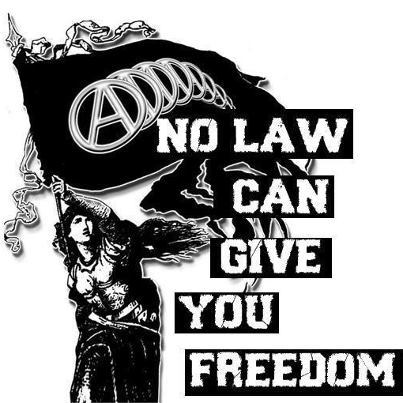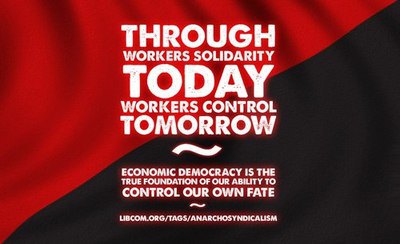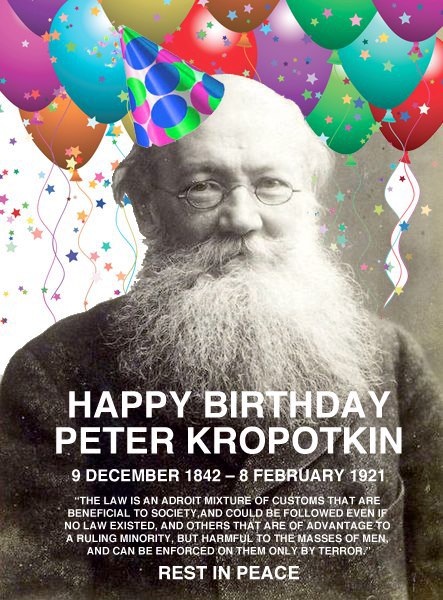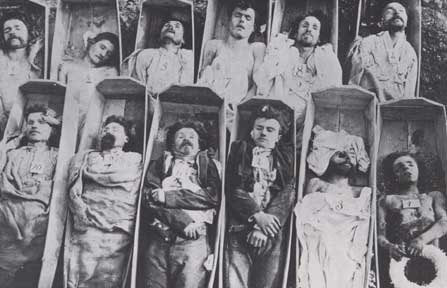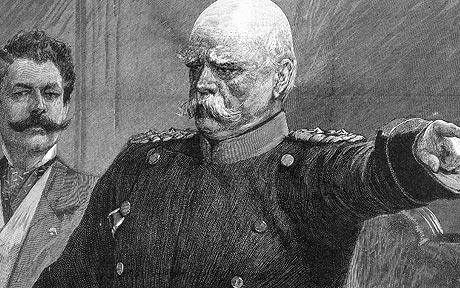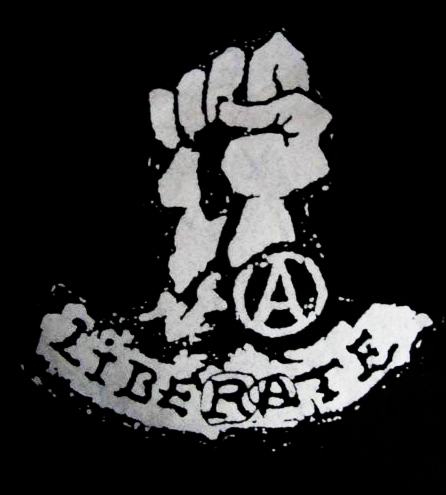In Volume One of Anarchism: A Documentary History of Libertarian Ideas, I included some excerpts from Kropotkin’s Words of a Rebel, in which he wrote that “To overthrow a government — that is everything for a bourgeois revolutionary. For us, it is only the beginning of the Social Revolution.” Here, I reproduce excerpts from an article he wrote for Freedom, the English anarchist paper which he helped found, on the necessity of economic communism after the overthrow of the government, emphasizing the positive measures that must be taken by the people themselves in order to make the revolutionary struggle worthwhile. What is particularly interesting is Kropotkin’s discussion regarding how a libertarian, or anarchist, communist society would function. Rather than, for example, housing being allotted by a new “revolutionary” government, which would soon turn into an unwieldly bureaucracy, at best, or a bureaucratic dictatorship, as happened in Russia, at worst, Kropotkin insists that the people themselves must work out a way of providing for each other’s housing needs by means of free agreement.
The Necessity of Communism
If all Socialists should agree… that the wants of all must be the first guiding consideration of any revolutionary movement which has a Socialist character — and we really cannot understand how this can be denied, or even underrated — then they would perceive that the next revolution, if it is guided by Socialist principle, must necessarily drive them to Communism, and Communism drive them to Anarchy.
Of course, if we admit that the next revolution will have accomplished its mission as soon as it succeeds in overthrowing the present rulers and proclaims some great industrial undertakings, like railways and mines, the property of a State democratized a bit — everything beyond that remaining as it is — then, of course, there is no use in speaking about Social Revolution at all. It is no use to describe with so pompous a word the visions of Herr Bismarck, who also dreams of taking all great branches of industry under the management of the State democratized by Imperial ism. We only remark that such a result would be utterly shabby in comparison with the great movement of ideas stirred up by Socialism; and that it stands in very strange contradiction with the hopes that Socialists are awakening precisely among the most miserable classes of labourers.
But, if those who describe themselves as revolutionists and really are revolutionists, at least with regard to their proceedings, if not always in ideas which inspire them, if they really mean a thorough modification of the present state of property, they cannot avoid perceiving that the day they begin any serious economical change in the present conditions of property, they immediately will have to face the problem of providing food for those who so long have suffered from want of it, of giving shelter to those who have none worthy the name of a dwelling, and of providing clothes for those who are now ragged and barefoot.
Not in the shape of charities, whosoever might distribute them; as charities distributed by a municipal or local board brought to power by the revolution would remain as much an insult to those to whom they were distributed as the charities of the millionaire at the present day; but as something which is due by society to everybody; and, first of all, precisely to those who have patiently waited for the ‘justice to all’ regularly promised by revolutionists and reformers, and always forgotten as soon as the said revolutionists and reformers are on the top of the political ladder. We do not care about ‘Coronation gifts’, be they distributed by a King, or by a shopkeeper acclaimed President of a Republic, or by a brother-workman nominated Municipal Councillor. We merely ask for what is due to everybody, everybody having contributed to the extent of his capacities to the creation of the riches which surround us.
To leave nobody without food, shelter and clothing, is the first and imperative duty of each popular movement inspired by Socialist ideas; and we wonder why our Socialist friends, so outspoken in their political programs, are so discreet exactly on this subject — the object, the first aim, in our opinion, of any movement worthy to be called Socialist. Is it a simple omission, or something so obvious that it is needless to waste words upon it?
But, if it is really so, then, how is it possible to avoid Communism entering into our life in the very first days of the revolution?
We have already said… why the revolution in our present conditions of property can only issue from widely- developed, independent local action. The miners of a more advanced mining district, the inhabitants of a more advanced city, cannot wait until all Great Britain is converted to their ideas by pamphlets, manifestoes, and speeches; they will go ahead, saying to themselves that the best means to convert everybody is by example.
And now, imagine a city in revolt where the majority follows the Socialists. What must the Socialists propose if they really wish to be with the masses, and march together with them for the conquest of the future? What must they propose if they mean to be in accordance with justice and with their own principles? The words Liberty, Equality, and Fraternity are surely grand and glorious words. We may inscribe them on each banner, and let them float over each house. We may even inscribe them, as our Paris neighbours do after each revolution, on each public building, even on prisons. But, what besides the words? Another word? The nationalization of land, of mines, of capital, which may be full of meaning, but may remain as meaningless as the great words of Fraternity, of Equality, of Liberty, when they are painted on prison walls?
As to us, Communist-Anarchists, the question we shall put to ourselves will not be, What shall we inscribe on our banners? It will be, What shall the workman eat during the next twenty-four hours? Is he able, and must he continue to pay the rent to the landlord and house-owner? Where will those who live in dens, or even have not a den to live in, spend the next night?
These plain, brutal questions will be asked in each workman’s household; they will be asked in each of the slums so particularly described a few years ago by the newspapers for the amusement of the occupiers of ducal and princely palaces; they will be asked, however limited the knowledge of the workman and the slum-inhabitant of Marx’s or Proudhon’s Political Economy. And they must be asked — and answered — by each earnest Socialist, unless his presumptuous learnedness considers a question too mean which has not been treated in Marx’s Capital, or in Proudhon’s Economical Contradictions.
Once asked, there is, however, no other answer to the question than this: There are so many houses in the city. Some of them are overcrowded, some others nearly empty; some of them being dens which even a beast would find too dirty, too wet, and too disgusting to stay in unless compelled to do so; and some others embellished with all the refinements of modern luxury.
It might remain so as long as we lived under the monopoly of private property. It could remain so as long as humanity was considered as consisting of two classes: the one created for the dens, and the other for the palaces. It could remain so as long as there was a State ruled by land, house, and capital owners, who exacted rack rents for their own benefit, and called in police and emergency men to evict the rebels who refused to enrich them. But it cannot remain so any longer.
Apart from a few cottages purchased by workmen families, at the price of all possible privations, none of these houses can be honestly considered as honestly acquired by their present owners. Humanity has built them; they belong to humanity, or at least to that part of humanity which is gathered on the spot. As soon as we proclaim that property — whatever its shape — is an accumulation of wealth due to the spoliation of the masses by the few — and who amongst Socialists does not affirm and reaffirm that principle? — we can no longer consider property in houses as a sacred right. They belong to all, and the very first thing we have to do is to consider what use can be made of them in order to provide everybody with a decent home.
The only rule to guide us must be the wants of each family, each of them being equally entitled to enjoy the produce of the labour of generations past and present. We cannot ask what each family will be able to pay for a house; it is not their fault if thousands and thousands, brought to misery by our former conditions, can afford to pay nothing, and even those who can produce will be reduced to idleness by the economic changes rendered necessary by the faults of our forefathers. It is not his fault if the man there who has half a dozen children has none of the accomplishments which characterize the owner of the palace and his daughters. He and his wife have worked all their life long; can the owner of the palace say as much of himself and his wife? And his rights to a decent dwelling are as good as that of the palace-owner.
And the Socialist who is not a mere quack must accept this standpoint: he must recognize that to take possession of the houses in the name of the city in revolt, and provide every inhabitant with a decent dwelling, is the very first duty of the Socialist who is in earnest, whose criticisms of the capitalist system have not been empty declamation.
Communism as to the dwelling must thus necessarily impose itself from the very first days of any serious Socialist movement.
But, who can come to an allotment of this very first necessity of life if the inhabitants themselves cannot do it? Can it be a local board? Can it be any other elected body which will order: Mr. A goes to house No. 10, and Mr. B to house No. 15? Obviously not! The settlement, any settlement which would last for some time, can only result from the initiative of all interested in the settlement, from the good-will of all in conjunction. And a first step towards Anarchy — towards the settlement of a grave social question without the intervention of Government — will be taken.
It will take some time to come to a satisfactory settlement of the question of dwellings. The Russian Mir spends sometimes three or four days before a hundred householders come to a unanimous agreement as to the repartition of the allotments of soil in accordance with the working powers of each family (there is no government to enforce a solution which is not unanimous), but they come nevertheless.
The settlement must be arrived at, for the very simple reason that the present inhabitants of the dens and slums will not recognize that they must forever remain in their slums and dens, and leave the palaces to the rulers of the day. And an approach to Communism will thus be enforced — even on the most individualistic collectivist.
Freedom, September 1887












